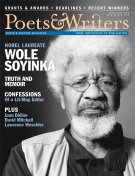In January, around the time James Frey was facing accusations that he fabricated details in A Million Little Pieces, a new literary agency, Folio Literary Management, opened its doors in New York City. Scott Hoffman, along with cofounders Paige Wheeler and Jeff Kleinman, started Folio because he was dissatisfied with the way other agencies were operating. Hoffman, Wheeler, and Kleinman figured one of the ways they could improve on standard agency practice was to develop an internal public relations department that would coordinate with a publisher’s marketing and publicity staff to push an author’s book. At the end of Folio’s second month in operation, Hoffman, who represents writers of fiction and nonfiction and receives between two hundred and five hundred queries a week, spoke about the role of agents in today’s publishing marketplace.

Your Web site states that Folio “takes up where other publishers leave off.” Can you explain?
Even for the biggest national and international best-sellers, most publishers are strapped for resources. There are only so many people in marketing and publicity at any given house, and they're very good at doing certain things. They’re good at getting to the major national publications, but they just don’t have the resources to do more targeted marketing to the local media. So we work in a very complementary way with publishers to try to do that for our clients.
You've said that you’re looking for first novels—even though it would seem those are the most difficult to sell. Why?
Of any books, first novels are probably the hardest to sell, but they’re also the most rewarding. And because the industry doesn’t do very much market research, doesn’t spend a lot of money trying to figure out who the consumers are and how to reach them, it often takes one seminal book to launch a craze—whether it’s a book like Bridget Jones’s Diary, which started chick lit; or a book like Reading Lolita in Tehran, which got everybody excited about the Middle East; or books by some of the African American female novelists who really pointed out to publishers how underserved that market was. If you’re the first in [any] category and you have that big book, it’s a franchise that lasts forever, and, you know, you change the world.
Has the James Frey controversy changed the way you think about or do your job?
To a certain extent it has. I think it's made everybody's BS detector a little more sensitive. But I think the old rule applies: If something seems too good to be true, it probably is.
Or too awful to be true, right?
Well, right—exactly. And I think “based on a true story” is just as good as “a true story.” I think what's going to happen is that more and more publishers of nonfiction are going to ask authors to warrant that what's actually going out in their books is true. And I think that's probably the best solution, because agencies obviously don’t have the resources to fact-check, and publishers don't either.
Has the role of a literary agent changed in the few years you’ve been in the industry?
A specific type of agent is becoming more and more successful—the agents that pay more editorial attention to their clients’ work.
How much editorial attention do you give manuscripts?
I would say it’s at least 50 percent of the job.
Kevin Larimer is the senior editor of Poets & Writers Magazine.








